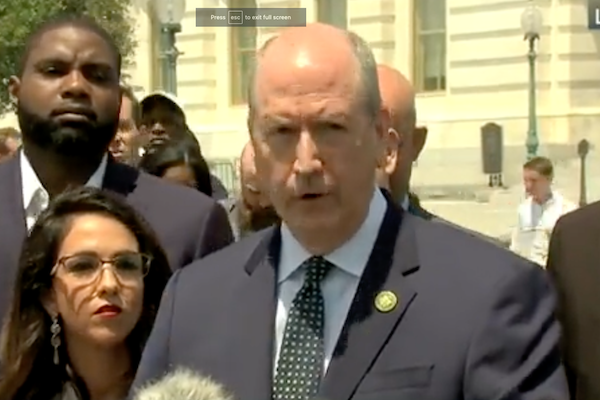Politics
WATCH: Rep. Bishop Goes Off Over Biden-McCarthy Debt Ceiling Deal

On Tuesday Rep. Dan Bishop (R-NC) openly voiced his dissent over the debt ceiling deal struck between Joe Biden and House Majority Leader Kevin McCarthy. Bishop passionately criticized the deal, disputing the purported financial estimates, the details of the Inflation Reduction Act, and other economic matters.
During an interview with Steve Bannon, Rep. Bishop questioned the economic impact and the projected figures involved in the agreement. He specifically pointed out that the forecasted four trillion dollars could potentially escalate, questioning the focus on green energy tax credits in the Inflation Reduction Act.
Bishop cited an estimate by Goldman Sachs stating that the cost would be approximately $279-$297 billion. However, he asserted, “The cost of that is wrong, is to be more than one point two trillion.”
Further, Bishop expressed concerns about the alleged fast-tracking of ‘permitting improvements’ to expedite green energy initiatives, doubting the credibility of the process.
The most heated portion of Bishop’s address occurred when he critically examined the IRS agent expansion provision. Rep. Bishop insisted that the claims made by Minority Leader McCarthy about ‘nixing’ the IRS agent expansion were “not just misleading…it’s factually false.”
According to Bishop, the bill will not simply take off $1.4 billion from the proposed $80 billion appropriations for the IRS as suggested by McCarthy, but would leave $78.6 billion available for the agency. The language of the bill, he said, does nothing to restrict IRS staffing levels and the agency could spend all they wanted immediately.
Bishop ended his speech by urging Republicans not only to vote against the bill but to understand that this vote is career-defining for every Republican. He lamented the misinformation presented, stating, “It’s not just that every Republican should vote against this. It’s a little bit more than that. This is a career-defining vote for every Republican.”
Dan Bishop makes the stakes clear:
"This is a career defining vote for every Republican."pic.twitter.com/cKMYQ0FEcs
— Citizen Free Press (@CitizenFreePres) May 30, 2023
Critics of the Biden-McCarthy debt ceiling agreement have applauded Bishop’s vehement stand, while proponents of the deal argue that it’s a necessary compromise to avoid a potentially disastrous government default. This remains a contentious issue within the Republican Party.
Biden and McCarthy reached an agreement to temporarily suspend the U.S. debt ceiling and cap some federal spending to prevent a U.S. debt default. The deal would suspend the $31.4 trillion debt ceiling until Jan. 1, 2025, allowing the U.S. government to pay its bills. In exchange, non-defense discretionary spending would remain largely at current-year levels in 2024.
The debt limit extension lasts past 2024, which means that Congress would not need to address the polarizing issue again until after the November 2024 presidential election. However, discussions on how to allocate money under the new spending caps will need to take place in Congress this year.
Notably, the deal would increase total defense spending to $886 billion, in line with Biden’s 2024 budget spending proposal, which represents a 3% increase from the $858 billion allocated in the current budget for the Pentagon and other defense-related programs.
Republicans secured a budgeting mechanism known as “Paygo,” short for pay-as-you-go, which stipulates that new government agency actions affecting revenues and spending should be offset by savings. However, the law would give Biden’s budget director the opportunity to issue waivers to that requirement and it would also limit judicial review of the decisions.

